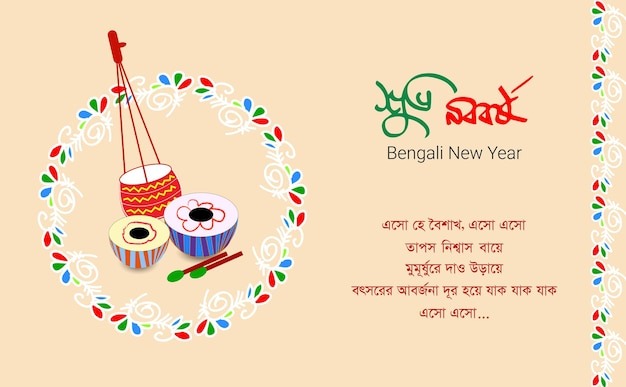Pohela Boishakh

Event Highlights
- Mangal Shobhajatra: This is the grand procession that usually kicks off the celebrations, featuring large, colorful, symbolic masks and statues that represent Bengali folklore. It’s both an artistic and cultural expression, honoring peace, unity, and hope.
- Traditional Performances: Cultural programs with traditional music and dance, including Baul songs, Jatra (folk theater), and Rabindra Sangeet (songs by Rabindranath Tagore), celebrate the richness of Bengali culture.
- Food Stalls: A highlight of Pohela Boishakh is the delicious traditional food, with popular dishes like panta bhat (fermented rice), hilsa fish, lentil soup, and bhorta (mashed vegetables and spices) available at street stalls and markets.
- Fairgrounds and Markets: Local artisans often display handmade crafts, traditional clothing, jewelry, and toys, creating a bazaar-like atmosphere. These fairs are a great place for families to gather and shop for unique items.
- Art Exhibitions and Workshops: Some Pohela Boishakh events also feature art exhibits and workshops, where participants can create Bengali folk art and learn traditional handicraft techniques.
Ticket Information
- Admission: In many areas, Pohela Boishakh celebrations are free and open to the public, especially in large gatherings like Dhaka’s Ramna Park or Kolkata’s Rabindra Sadan. However, some organized events, concerts, or private cultural shows may require tickets.
- Ticket Prices: Tickets, when applicable, generally range from $5 to $50 depending on the event, venue, and seating options. Children under a certain age may be free, but it varies by organizer.
- Booking: Tickets for select Pohela Boishakh events can typically be purchased through local event sites, community centers, or even via international platforms if the event is hosted by expatriate communities in other countries.
Pohela Boishakh is a cherished cultural festival for the Bengali community, and its joyous atmosphere of dance, food, and festivities provides a fantastic start to the Bengali New Year.
4o

